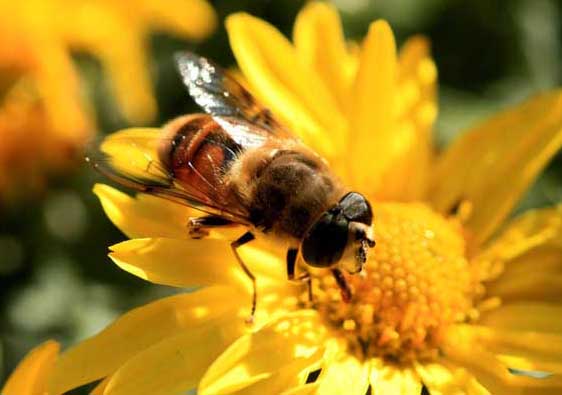(单词翻译:单击)
听力文本
This is Scientific American — 60-Second Science. I'm Christopher Intagliata.
Over the last year, beekeepers in the U.S. lost nearly half their honeybee hives. And there are a lot of suspected culprits for this so-called beepocalypse—from parasitic mites, to viruses, to simple land use changes. But a study out earlier this year pointed to another possibility: poor sperm quality among the drone bees, leading to colony crashes. And now another group of researchers may have found a reason for the subpar sperm: neonicotinoid pesticides. These substances contain chemicals similar to nicotine and affect insect nervous systems.
"So for the drones that were exposed to pesticides during development, it appears there were more dead sperm in their reproductive tracts." Geoff Williams, an entomologist at the University of Bern in Switzerland and Agroscope, a Swiss federal research facility.

Williams and his colleagues studied the effects of two neonicotinoid pesticides on honeybee drones, genetically assigned to mate with queens. "They've got really big eyes so they can identify these queens flying through the air. They eat and have sex. Or try to have sex at least."
But in 20 honeybee hives Williams and his collaborators found that those drones exposed to standard environmental levels of the pesticides were shorter-lived, thus having fewer opportunities to mate. And even if the drones did survive, they had nearly 40 percent fewer living sperm than did control bees—meaning the pesticides were acting like honeybee contraceptives. The study appears in the Proceedings of the Royal Society B.
Williams says pesticides are just one of many factors assaulting bees. But it looks like the way farmers treat some crops could adversely affect the pollinators those crops also rely on.
Thanks for listening for Scientific American — 60-Second Science Science. I'm Christopher Intagliata.
参考译文
这里是科学美国人——60秒科学。我是克里斯托弗·因塔利亚塔。
去年,美国养蜂者损失了近一半的蜂箱。对于这次蜜蜂灾难,有很多疑似“罪魁祸首”——如病毒寄生、土地利用的简单变化等。但是今年初发表的一项研究指出了另外一种可能:雄峰的精子质量不良,导致了这场种族灾难。现在,另一组研究人员发现了雄峰精子质量不正常的原因:烟碱类农药杀虫剂。这些农药中含有类似尼古丁的物质,这种物质会影响蜜蜂的神经系统。
“雄峰在成长程中接触了杀虫剂,这导致其生殖系统中产生了更多的死精子。”杰夫·威廉姆斯是瑞士伯尔尼大学和瑞士联邦农业研究院的昆虫学家。
威廉姆斯和同事研究了两种烟碱类农药对雄峰的影响,确切地来说,是对和蜂后交配的雄蜂的影响。“这些雄蜂的眼睛非常大,所以它们可以识别出在空中飞行的蜂后,它们一起吃和交配。或至少尝试交配。”
但是在威廉姆斯和同事们研究的20个蜂箱中,这些雄蜂接触了标准环境水平的杀虫剂后,寿命会减少,从而使其与蜂后交配的机会减少。即使雄蜂能存活下来,但其活精子的数量与实验室的蜜蜂相比减少了40%,这就相当于农药充当了蜜蜂的避孕药。该项研究结果发表在《皇家协会B》杂志上。
威廉姆斯表示,杀虫剂只是使蜜蜂受冲击的因素之一。看起来农民处理农作物的方式也会对这些农作物依赖的授粉者产生不利影响。
谢谢大家收听科学美国人——60秒科学。我是我是克里斯托弗·因塔利亚塔。
译文为可可英语翻译,未经授权请勿转载!
重点讲解
重点讲解:
1. point to 显示;表明;
例句:Earlier reports pointed to pupils working harder, more continuously, and with enthusiasm.
早些时候的报告显示学生学习更为刻苦、持久,并且怀有学习热情。
2. be exposed to 使暴露于(险境);使遭受(危险或不快);
例句:This plant can't be exposed to strong sunshine.
这种植物不能暴露在强光下。
3. even if 即使;尽管;纵然;
例句:Even if she is responsible for the mistake, she is not likely to own up to it.
即使是她犯的错,她也不太可能会爽快承认的。
4. rely on 依赖;依靠;
例句:We will get nowhere if we rely on luck.
如果我们只依靠运气,那将一事无成。


